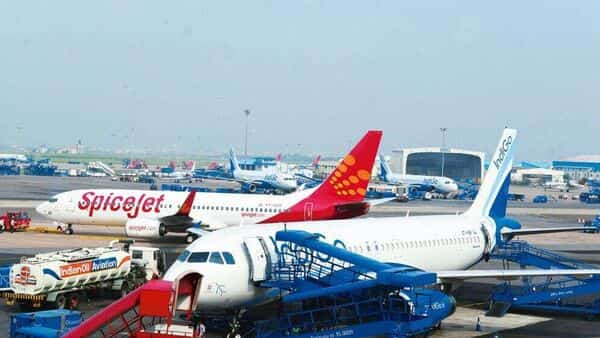[ad_1]
NEW DELHI : The winter schedule for airlines in India started on 30 October, with companies bracing for the impact of supply chain issues due to a a shortage of parts, engines and planes.
“For any industry, capacity deployment is a key parameter for its fixed cost absorption. Supply chain issues for aircraft, leading to their non-availability for flying, will lead to under absorption of capacity, impacting the earnings, given we are in the midst of the winter/festive travel season,” said Suprio Banerjee, vice president and sector head at ICRA.
There are visible challenges that Indian airlines are facing due to supply chain issues. For IndiGo, the largest airline in the country with a 58% market share, over 35 aircraft, or more than 12% of its fleet, have been grounded for at least seven days, a data analysis by Mint from Flightradar24 showed. The problem is not limited to IndiGo and is more severe for airlines such as GoFirst, which has around 8% market share and have a fleet size of 59 aircraft. Data analysis by Mint showed that more than 25 aircraft, or nearly 47% of its fleet, have been grounded for at least seven days. “The unavailability of spare engines and parts is a primary issue which has led most of these aircraft of IndiGo, GoFirst out of operations. It is not that spare engines are not being supplied at all. The pace of supply has been severely hit first by the covid-induced lockdowns worldwide impacting manufacturing lines and then with the slowdown due to the Ukraine war,” an industry expert said.
Globally, airlines are facing both supply chain and non-supply chain issues, and the non-supply chain issues, especially in Europe and North America, are related to labour, said Kapil Kaul, chief executive officer and director, CAPA India. “In India, especially for the second half of FY23, there will be an impact due to supply chain issues as aircraft are grounded due to lack of engines and a significant slowdown in new deliveries, which is impacting all airlines,” Kaul said. “But, the impact of delay in supply of new deliveries can bring some demand and supply stability, which in the current adverse cost environment, may be positive in the short term, especially over the next 6-9 months,” he added.
Air India, Vistara, IndiGo, and SpiceJet have opted to lease aircraft to meet short to medium-term capacity needs. While IndiGo is adding three B777 wide-body aircraft on wet lease to address the capacity need on the India-Istanbul route, Air India has chalked out a 15-month plan where it will receive 30 aircraft on lease. IndiGo said the aviation industry continues to face significant supply chain disruptions. “We are actively engaged with our OEM (original equipment manufacturer) partners to work mitigation measures which should ensure continuity of our network and operations. As we work on various cost-efficient countermeasures with our OEM partners, the endeavour is to minimize the adverse economic impact resulting from this global disruption,” an IndiGo spokesperson said. “To address planned capacity and expansion for growth, we are looking at all levers to offset the headwind posed by the global supply chain disruption. Some of the measures being evaluated include slowing down redeliveries through lease extensions, exploring the reinduction of aircraft into the fleet and evaluating the wet lease options within the regulatory guidelines.”
Vistara recently opted for a wide-body B787 on lease to address international capacity needs due to a delay in new B787 delivery. However, it cancelled planned Frankfurt flights as the leased aircraft is yet to be delivered. SpiceJet has also received regulatory approval for wet leasing five Boeing 737 Max planes for up to six months. While leasing an aircraft is a short-term solution, it is challenging, as it requires commercial negotiations and technical inspections, and the configuration of the interiors is certainly different from what one operates. There are often challenges during aircraft rotation, as one day you may get 288 seats and 305 seats on another, and engine support also needs to be considered, Air India CEO Campbell Wilson recently said. Airlines face two main challenges: unstable demand and volatility in jet fuel prices. Moreover, as components are imported, the depreciating rupee leads to increased costs, analysts said. “Airlines, however, will obviously look at measures including leasing coupled with better coordination with the OEMs for supply of such spares/components to minimize the grounding of aircraft owing to supply chain issues,” said Banerjee at ICRA.
Download The Mint News App to get Daily Market Updates & Live Business News.
[ad_2]
Source link
John Miller has been writing about science, gaming, and tech culture for over a decade. He’s a top-rated reviewer with extensive experience helping people find the best deals on tech and more.



